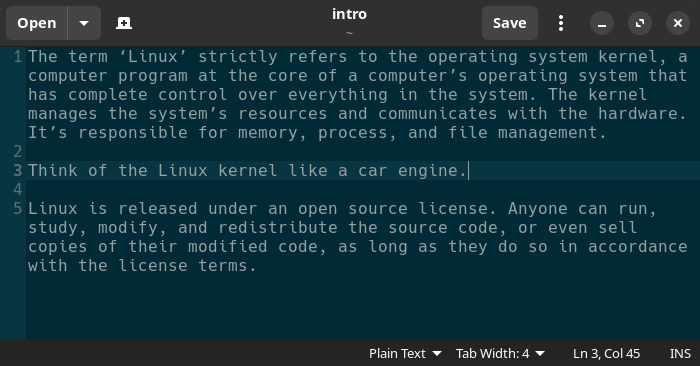gedit is a small and lightweight text editor for the GNOME environment.
Complete GNOME integration is provided, with support for Drag and Drop (DnD) from Nautilus (the GNOME file manager), the use of the GNOME help system, the GNOME Virtual File System and the GNOME print framework.
gedit uses a Multiple Document Interface (MDI), which lets you edit more than one document at the same time.
gedit supports most standard editing features, plus several not found in your average text editor (plugins being the most notable of these).
This is free and open source software.
Features include:
- Files are opened in tabs.
- Full support for internationalized text (UTF-8).
- Syntax highlighting for lots of languages (Python, Shell, C, C++, HTML, CSS, JavaScript, XML, Markdown and many others).
- Configurable fonts and colors.
- Print and print preview support.
- Search and replace with support of regular expressions.
- A side panel with an integrated file browser.
- Spell-checking.
- Word auto-completion.
- Undo/Redo.
- Auto indentation.
- Text wrapping.
- Line numbers.
- Right margin.
- Highlight current line.
- Highlight matching brackets.
- Editing files from remote locations.
- Backup files.
- A flexible plugin system which can be used to dynamically add new advanced features:
- Document Statistics – Report the number of words, lines and characters in a document.
- External Tools – Execute external commands and shell scripts.
- File Browser Panel – Easy file access from the side panel.
- Insert Date/Time – Inserts current date and time at the cursor position.
- Modelines – Emacs, Kate and Vim-style modelines support for gedit.
- Python Console – Interactive Python console standing in the bottom panel.
- Quick Highlight – Highlights every occurrences of selected text.
- Quick Open – Quickly open files.
- Snippets – Insert often-used pieces of text in a fast way.
- Sort – Sorts a document or selected text.
- Spell Checker – Checks the spelling of the current document.
- Bookmarks – Easy document navigation with bookmarks.
- Bracket Completion – Automatically adds closing brackets.
- Character Map – Insert special characters just by clicking on them.
- Code Comment – Comment out or uncomment a selected block of code.
- Color Picker – Pick a color from a dialog and insert its hexadecimal representation.
- >Draw Spaces – Draw spaces and tabs.
- Embedded Terminal – Embed a terminal in the bottom panel.
- Git – Highlight lines that have been changed since the last commit.
- Join/Split Lines – Join several lines or split long ones.
- Multi Edit – Edit document in multiple places at once.
- Session Saver – Save and restore your working sessions.
- Smart Spaces – Forget you’re not using tabulations.
- Text Size – Easily increase and decrease the text size.
- Word Completion – Auto-completion using words already present in open documents.
Website: wiki.gnome.org/Apps/Gedit
Support:
Developer: gedit team
License: GNU General Public License v2.0

gedit is written in C and Python. Learn C with our recommended free books and free tutorials. Learn Python with our recommended free books and free tutorials.
Return to Simple GUI Text Editors
| Popular series | |
|---|---|
| The largest compilation of the best free and open source software in the universe. Each article is supplied with a legendary ratings chart helping you to make informed decisions. | |
| Hundreds of in-depth reviews offering our unbiased and expert opinion on software. We offer helpful and impartial information. | |
| The Big List of Active Linux Distros is a large compilation of actively developed Linux distributions. | |
| Replace proprietary software with open source alternatives: Google, Microsoft, Apple, Adobe, IBM, Autodesk, Oracle, Atlassian, Corel, Cisco, Intuit, and SAS. | |
| Awesome Free Linux Games Tools showcases a series of tools that making gaming on Linux a more pleasurable experience. This is a new series. | |
| Machine Learning explores practical applications of machine learning and deep learning from a Linux perspective. We've written reviews of more than 40 self-hosted apps. All are free and open source. | |
| New to Linux? Read our Linux for Starters series. We start right at the basics and teach you everything you need to know to get started with Linux. | |
| Alternatives to popular CLI tools showcases essential tools that are modern replacements for core Linux utilities. | |
| Essential Linux system tools focuses on small, indispensable utilities, useful for system administrators as well as regular users. | |
| Linux utilities to maximise your productivity. Small, indispensable tools, useful for anyone running a Linux machine. | |
| Surveys popular streaming services from a Linux perspective: Amazon Music Unlimited, Myuzi, Spotify, Deezer, Tidal. | |
| Saving Money with Linux looks at how you can reduce your energy bills running Linux. | |
| Home computers became commonplace in the 1980s. Emulate home computers including the Commodore 64, Amiga, Atari ST, ZX81, Amstrad CPC, and ZX Spectrum. | |
| Now and Then examines how promising open source software fared over the years. It can be a bumpy ride. | |
| Linux at Home looks at a range of home activities where Linux can play its part, making the most of our time at home, keeping active and engaged. | |
| Linux Candy reveals the lighter side of Linux. Have some fun and escape from the daily drudgery. | |
| Getting Started with Docker helps you master Docker, a set of platform as a service products that delivers software in packages called containers. | |
| Best Free Android Apps. We showcase free Android apps that are definitely worth downloading. There's a strict eligibility criteria for inclusion in this series. | |
| These best free books accelerate your learning of every programming language. Learn a new language today! | |
| These free tutorials offer the perfect tonic to our free programming books series. | |
| Linux Around The World showcases usergroups that are relevant to Linux enthusiasts. Great ways to meet up with fellow enthusiasts. | |
| Stars and Stripes is an occasional series looking at the impact of Linux in the USA. | |
